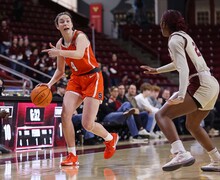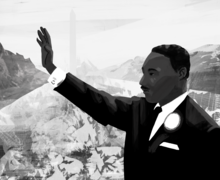Social media rejuvenates job search, incorporated in students’ lives
Now hiring: full-time tweeter.
An increasing number of Syracuse University graduates are being hired for social media as professional tweeters and Facebookers — and they’re getting paid to do it.
John Burke, a 2012 alumnus, said he always knew he wanted to work in the aviation industry. He admired JetBlue Airways’ social media presence, and reached out to their Twitter handle to discuss aviation news and job postings. In one tweet, Burke mentioned he aspired to be an airline CEO.
Then David Barger, the CEO of JetBlue, tweeted at him.
“Talk about the most stressful 140 characters of my life,” Burke said.
Barger asked how he could help, and connected Burke with JetBlue’s vice president of talent, Bonny Simi. Burke and Simi corresponded through email, and she invited him for a tour of the building and “informal informational interview.”
“When I came to visit and met some of the leaders, I was able to show my enthusiasm and knowledge of JetBlue,” he said.
A week later, Simi offered Burke an internship as her coordinator and special projects manager.
Currently, 429 SU alumni have the words “social media” in their current job title on LinkedIn. Also the 40th most popular skill on LinkedIn, social media has experienced an annual increase of 33 percent.
SU students and graduates are not just landing jobs in social media – employers are also using it to recruit them. In 2012, companies used social media for more than 80 percent of job openings, Ventana Research reported. Ninety-eight percent of recruiters used LinkedIn to hire candidates, with a 94.5 percent success rate. Nearly half used Twitter.
Carly Getz, a senior public relations and marketing major, said she uses social media to network. She works at Blue Highway Inc., a subsidiary of SU, as a digital marketing intern. She manages Blue Highway’s social media accounts, publishing health and technology-related content.
“People who are blindly applying to jobs are doing the wrong thing,” she said.
Kim Brown, the assistant director of alumni programs and a consultant at SU Career Services, frequently tweets jobs to students and encourages them to brand themselves through social media.
Her Twitter handle, @kimincuse, has more than 4,000 followers.
“I’ve had some of my online followers come up to me and yell, ‘Kim in ‘Cuse! It’s so nice to meet you in real life!’ Everyone knows me by my Twitter handle,” she said.
Brown, who also teaches a broadcast and digital journalism course at SU, said she wishes students would learn how to use social media responsibly.
“I learn way too much about my students’ Halloween plans from their public Twitter accounts,” she said.
Businesses are starting to understand the importance and profitability of social media, especially because it costs nearly nothing.
Phil Mackey, a sports columnist and reporter for “The Reusse & Mackey Show” on 1500 ESPN Twin Cities radio, works closely with the social media team for Hubbard Broadcasting. His company is currently looking to hire a full-time social media strategist. He said the radio industry worries about staying relevant in a digital age.
“Ten years ago, the only radio options in your car were local AM and FM stations,” he said. “In 2013, I have the ability to listen to SiriusXM in my car, as well as any other radio station in the country, just by using Bluetooth connectivity and iPhone applications.”
He believes branding through social media will increase the fan base of 1500 ESPN Twin Cities radio. His sales staff uses social media to attract new clients by searching for local businesses that follow Mackey.
Most small businesses use social media to increase brand recognition and modernize customer service.
“Companies have this unbelievable ability to see what customers are saying about their products, and they need to manage that,” Brown said.
When John Burke was a student, he worked for #44Social, the social media team at SU. He said he quickly learned that his tweets represented an entire university.
“Engaging a diverse audience of students, faculty, alumni, sports fans, other schools and potential students was extremely challenging,” he said. “It took us some time to develop a voice and learn to handle some sensitive topics and situations when they came up.”
As networks continue to grow, Mackey believes social media will not only serve as an identity of a company, but also of an individual. Both Burke and Getz anticipate it will become more difficult for students to stand out to employers.
Whether on or offline, Burke believes it is important to be authentic.
Said Burke: “Post interesting articles relevant to your industry. Follow and engage with people at companies you admire. If they are receptive and come to your profile and see that you’re not just begging for a job, but just being yourself, it will speak volumes about you.”
Published on February 28, 2013 at 12:15 am
Contact Leanna: lmgarfie@syr.edu





